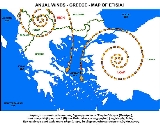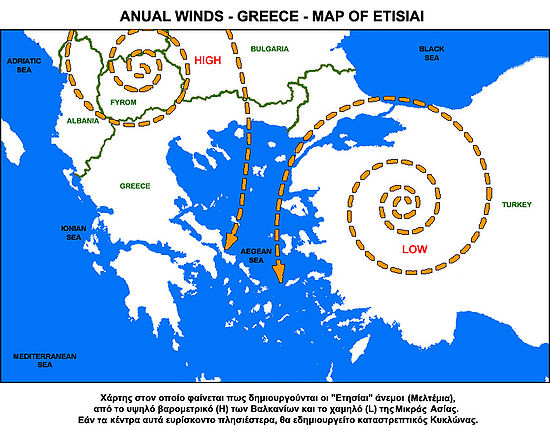
Etesian
Encyclopedia
The etesians meltemi μελτέμι (Greek
), or meltem (Turkish
) are the strong, dry north winds
of the Aegean Sea
, which blow from about mid-May to mid-September. According to C.Michael Hogan, the Etesian winds are the dominant weather influence in the Aegean Basin.
During hot summer days, this is by far the most preferred weather type and is considered a blessing. They are at their strongest in the afternoon and often die down at night, but sometimes meltemi winds last for days without a break. Similar winds blow in the Adriatic and Ionian
regions. Meltemi winds are dangerous to sailor
s because they come up in clear weather without warning and can
blow at 7-8 Beaufort
. Some yacht
s and most inter island ferries
cannot sail under such conditions.
The Greek word derives from the Greek
word έτος (étos), meaning year, connotating their yearly fluctuation in frequency of appearance. Indeed, these winds have been described since ancient times and the word etesian (Greek: ετησίες) means annual. The Turkish form is probably a loan
from Italian
mal tempo 'bad weather'. Though it is sometimes called a monsoon
wind, the meltemi is dry and does not correspond to an opposite wind in the winter. However, the etesians are distantly correlated with the summer monsoons of the Indian subcontinent, as it is a trough
of low pressure into the Eastern Mediterranean region that enforces, if not causes, the etesians to blow in summer. A Mediterranean climate
is sometimes called an etesian climate.
Etesians are due chiefly to the deep continental depression centered over southwest Asia and blow from a direction which may be anywhere between north-east and north-west depending on local topography; meltemi weather is ordinarily fine and clear, the northerly winds tempering the fierce summer heat of the region.
In the Northern Aegean sea, the etesians blow as winds of northeasterly to northerly direction. Moving south, in the central Aegean, they blow as winds of northerly direction, while, in the southern Aegean, the Cretan and the Carpathian sea, they blow as northwesterlies. The same winds blow in Cyprus
as westerlies to southwesterlies, being more humid.
Historically, Philip II of Macedon
timed his military operations so that powerful southern fleets could not reach him: their ships could sail north only very slowly while the Etesian winds were blowing.
 .
.
Greek language
Greek is an independent branch of the Indo-European family of languages. Native to the southern Balkans, it has the longest documented history of any Indo-European language, spanning 34 centuries of written records. Its writing system has been the Greek alphabet for the majority of its history;...
), or meltem (Turkish
Turkish language
Turkish is a language spoken as a native language by over 83 million people worldwide, making it the most commonly spoken of the Turkic languages. Its speakers are located predominantly in Turkey and Northern Cyprus with smaller groups in Iraq, Greece, Bulgaria, the Republic of Macedonia, Kosovo,...
) are the strong, dry north winds
of the Aegean Sea
Aegean Sea
The Aegean Sea[p] is an elongated embayment of the Mediterranean Sea located between the southern Balkan and Anatolian peninsulas, i.e., between the mainlands of Greece and Turkey. In the north, it is connected to the Marmara Sea and Black Sea by the Dardanelles and Bosporus...
, which blow from about mid-May to mid-September. According to C.Michael Hogan, the Etesian winds are the dominant weather influence in the Aegean Basin.
During hot summer days, this is by far the most preferred weather type and is considered a blessing. They are at their strongest in the afternoon and often die down at night, but sometimes meltemi winds last for days without a break. Similar winds blow in the Adriatic and Ionian
Ionian Sea
The Ionian Sea , is an arm of the Mediterranean Sea, south of the Adriatic Sea. It is bounded by southern Italy including Calabria, Sicily and the Salento peninsula to the west, southern Albania to the north, and a large number of Greek islands, including Corfu, Zante, Kephalonia, Ithaka, and...
regions. Meltemi winds are dangerous to sailor
Sailor
A sailor, mariner, or seaman is a person who navigates water-borne vessels or assists in their operation, maintenance, or service. The term can apply to professional mariners, military personnel, and recreational sailors as well as a plethora of other uses...
s because they come up in clear weather without warning and can
blow at 7-8 Beaufort
Beaufort scale
The Beaufort Scale is an empirical measure that relates wind speed to observed conditions at sea or on land. Its full name is the Beaufort Wind Force Scale.-History:...
. Some yacht
Yacht
A yacht is a recreational boat or ship. The term originated from the Dutch Jacht meaning "hunt". It was originally defined as a light fast sailing vessel used by the Dutch navy to pursue pirates and other transgressors around and into the shallow waters of the Low Countries...
s and most inter island ferries
Ferry
A ferry is a form of transportation, usually a boat, but sometimes a ship, used to carry primarily passengers, and sometimes vehicles and cargo as well, across a body of water. Most ferries operate on regular, frequent, return services...
cannot sail under such conditions.
The Greek word derives from the Greek
Greek language
Greek is an independent branch of the Indo-European family of languages. Native to the southern Balkans, it has the longest documented history of any Indo-European language, spanning 34 centuries of written records. Its writing system has been the Greek alphabet for the majority of its history;...
word έτος (étos), meaning year, connotating their yearly fluctuation in frequency of appearance. Indeed, these winds have been described since ancient times and the word etesian (Greek: ετησίες) means annual. The Turkish form is probably a loan
Loanword
A loanword is a word borrowed from a donor language and incorporated into a recipient language. By contrast, a calque or loan translation is a related concept where the meaning or idiom is borrowed rather than the lexical item itself. The word loanword is itself a calque of the German Lehnwort,...
from Italian
Italian language
Italian is a Romance language spoken mainly in Europe: Italy, Switzerland, San Marino, Vatican City, by minorities in Malta, Monaco, Croatia, Slovenia, France, Libya, Eritrea, and Somalia, and by immigrant communities in the Americas and Australia...
mal tempo 'bad weather'. Though it is sometimes called a monsoon
Monsoon
Monsoon is traditionally defined as a seasonal reversing wind accompanied by corresponding changes in precipitation, but is now used to describe seasonal changes in atmospheric circulation and precipitation associated with the asymmetric heating of land and sea...
wind, the meltemi is dry and does not correspond to an opposite wind in the winter. However, the etesians are distantly correlated with the summer monsoons of the Indian subcontinent, as it is a trough
Trough (meteorology)
A trough is an elongated region of relatively low atmospheric pressure, often associated with fronts.Unlike fronts, there is not a universal symbol for a trough on a weather chart. The weather charts in some countries or regions mark troughs by a line. In the United States, a trough may be marked...
of low pressure into the Eastern Mediterranean region that enforces, if not causes, the etesians to blow in summer. A Mediterranean climate
Mediterranean climate
A Mediterranean climate is the climate typical of most of the lands in the Mediterranean Basin, and is a particular variety of subtropical climate...
is sometimes called an etesian climate.
Etesians are due chiefly to the deep continental depression centered over southwest Asia and blow from a direction which may be anywhere between north-east and north-west depending on local topography; meltemi weather is ordinarily fine and clear, the northerly winds tempering the fierce summer heat of the region.
In the Northern Aegean sea, the etesians blow as winds of northeasterly to northerly direction. Moving south, in the central Aegean, they blow as winds of northerly direction, while, in the southern Aegean, the Cretan and the Carpathian sea, they blow as northwesterlies. The same winds blow in Cyprus
Cyprus
Cyprus , officially the Republic of Cyprus , is a Eurasian island country, member of the European Union, in the Eastern Mediterranean, east of Greece, south of Turkey, west of Syria and north of Egypt. It is the third largest island in the Mediterranean Sea.The earliest known human activity on the...
as westerlies to southwesterlies, being more humid.
Historically, Philip II of Macedon
Philip II of Macedon
Philip II of Macedon "friend" + ἵππος "horse" — transliterated ; 382 – 336 BC), was a king of Macedon from 359 BC until his assassination in 336 BC. He was the father of Alexander the Great and Philip III.-Biography:...
timed his military operations so that powerful southern fleets could not reach him: their ships could sail north only very slowly while the Etesian winds were blowing.

See also
- List of local winds
- Bora (wind)Bora (wind)Bora or Bura is a northern to north-eastern katabatic wind in the Adriatic, Bosnia and Herzegovina, Croatia, Montenegro, Italy, Greece, Slovenia, and Turkey....
- GregaleGregaleThe Gregale is a Mediterranean wind that can occur during times when a low pressure area moves through the area to the south of Malta and causes a strong, cool, northeasterly wind to affect the island...
- Khamaseen
- LevantadesLevantadesGales from between north-north-east and east-north-east are the most important gales of the east coast of Spain. They are known locally as llevantades and are an intense form of the llevante or levanter, i.e., north-easterly winds of long fetch, as opposed to diurnal coastal breezes...
- LevecheLevecheLebeche is the Spanish name for a warm southwest wind in parts of coastal Mediterranean Spain, either a foehn wind or a hot southerly wind in advance of a low pressure area moving from the Sahara Desert...
- Marin (wind)Marin (wind)The Marin is a warm, moist wind in the Gulf of Lion of France, blowing from the southeast or south-southeast onto the coast of Languedoc and Roussillon. It brings rain to this region which it has picked up crossing the Mediterranean, and also can bring coastal fog...
- Mistral (wind)Mistral (wind)The mistral is a strong, cold and usually dry regional wind in France, coming from the north or northwest, which accelerates when it passes through the valleys of the Rhone and the Durance Rivers to the coast of the Mediterranean around the Camargue region. It affects the northeast of the plain...
- SiroccoSiroccoSirocco, scirocco, , jugo or, rarely, siroc is a Mediterranean wind that comes from the Sahara and reaches hurricane speeds in North Africa and Southern Europe. It is known in North Africa by the Arabic word qibli or ghibli Sirocco, scirocco, , jugo or, rarely, siroc is a Mediterranean wind...

